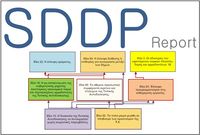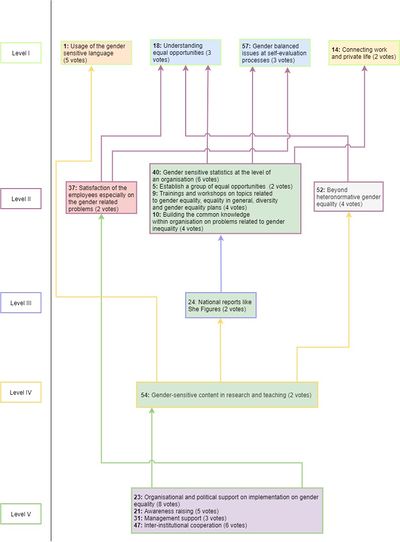R-I-Peers Ljubljana SDDP Identification of measures and actions for successful Gender Equality Plans implementation within Research Performing Organisations: Difference between revisions
No edit summary |
No edit summary |
||
| (One intermediate revision by the same user not shown) | |||
| Line 13: | Line 13: | ||
|stats=Participants=15 <br> Number of ideas=54 <br> Number of Clusters=7 <br> Ideas received Votes=28 <br> Ideas on MAP R=16 <br> Spreadthink ST=47% | |stats=Participants=15 <br> Number of ideas=54 <br> Number of Clusters=7 <br> Ideas received Votes=28 <br> Ideas on MAP R=16 <br> Spreadthink ST=47% | ||
|isbn=ISBN | |isbn=ISBN | ||
|link=[[Media:R-I_PEERS_D6.6_final.pdf|Download Report]] | |link=[[Media:R-I_PEERS_D6.6_final.pdf|Download Report]]<br> | ||
[[Media:R-I PEERS Deliverable SUBMITTED 6.6.pdf|Formal Report Rome & Ljubljana]] | |||
}} | }} | ||
| Line 23: | Line 24: | ||
The Mutual Learning workshop “Towards the identification of measures and actions for successful Gender Equality Plans implementation within Research Performing Organisations (RPO)” was organised by [[Research Centre of the Slovenian Academy of Sciences and Arts|ZRC SAZU]] and [[Cyprus Neuroscience and Technology Institute|CNTI]] in the context of the project [[R&I PEERS]] funded by the European Union’s Horizon 2020 Research and Innovation Programme, on October 14th, 2019 in Ljubljana, Slovenia. | The Mutual Learning workshop “Towards the identification of measures and actions for successful Gender Equality Plans implementation within Research Performing Organisations (RPO)” was organised by [[Research Centre of the Slovenian Academy of Sciences and Arts|ZRC SAZU]] and [[Cyprus Neuroscience and Technology Institute|CNTI]] in the context of the project [[R&I PEERS]] funded by the European Union’s Horizon 2020 Research and Innovation Programme, on October 14th, 2019 in Ljubljana, Slovenia. | ||
The workshop, which was realised using the participatory methodology of the Structured Democratic Dialogue (SDD), brought together fifteen (15) experts from the gender equality field representing universities, governmental and scientific bodies to discuss measures and actions to facilitate the development and execution of Gender Equality Plans (GEPs) in Research Performing Organisations (RPOs). | The workshop, which was realised using the participatory methodology of the [[Structured Democratic Dialogue]] (SDD), supported by [[Concertina]], brought together fifteen (15) experts from the gender equality field representing universities, governmental and scientific bodies to discuss measures and actions to facilitate the development and execution of Gender Equality Plans (GEPs) in Research Performing Organisations (RPOs). | ||
<br> | <br> | ||
Latest revision as of 04:52, 25 July 2023
|
Executive Summary
The Mutual Learning workshop “Towards the identification of measures and actions for successful Gender Equality Plans implementation within Research Performing Organisations (RPO)” was organised by ZRC SAZU and CNTI in the context of the project R&I PEERS funded by the European Union’s Horizon 2020 Research and Innovation Programme, on October 14th, 2019 in Ljubljana, Slovenia.
The workshop, which was realised using the participatory methodology of the Structured Democratic Dialogue (SDD), supported by Concertina, brought together fifteen (15) experts from the gender equality field representing universities, governmental and scientific bodies to discuss measures and actions to facilitate the development and execution of Gender Equality Plans (GEPs) in Research Performing Organisations (RPOs).
The Triggering Question (TQ) of the workshop was:
"What measures/actions (administrative, organizational culture-related, financial, legal...) should be taken to make Gender Equality Plan implementation beneficial for all employees in research organizations?"
In response to the TQ, the 15 participants came up with 54 ideas, which were categorized into 7 clusters.
- Cluster Gender- sensitive content
- Cluster Awareness raising
- Cluster Data gathering
- Cluster General administrative measures
- Cluster Human resources management
- Cluster "Soft" skills
- Cluster Structural changes
Following the voting process, 28 ideas received one or more votes (ST 47%) and were structured to create the influence MAP shown below.
According to the participants of this workshop, the practices that appear to be the most influential were:
- Practice #23: (8 votes) Organisational and political support on implementation on gender equality
- Practice #21: (5 votes) Awareness raising
- Practice #31: (3 votes) Management support
- Practice #47: (6 votes) Inter-institutional cooperation
- Practice #54: (2 votes) Gender-sensitive content in research and teaching
The workshop was facilitated by Andreas P. Andreou.
Serving as R&D for further development of Wisdom Tools
The data from this and from other SDDPs of H2020 projects have been also used to test and validate the next versions of wisdom tools developed by Future Worlds Center in collaboration with Ekkotek, such as:

